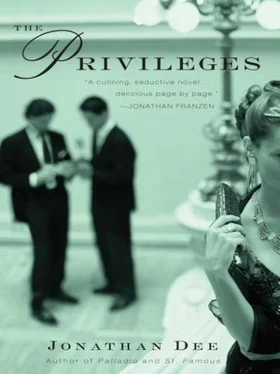It wasn’t even his chief source of income, at least not anymore. His compensation at Perini had soared, and deservedly so. This was more in the nature of a self-administered bonus. In the course of his work he learned some things about a given company, things not of a public nature; based on this information he gave Devon an instruction on the buying or the selling of that company’s stock, spread out through about thirty small accounts with dummy names managed by Devon and the others; each account transferred its profits to different offshore banks, all of which then sent the money, in slow increments, to the Royal National Bank of Anguilla, where oversight policies were business-friendly. Adam’s share in the last year was less than half a million. It was a nice margin to have, certainly, and every little bit added to the range of possibilities in his family’s lives. But they didn’t depend on it. He could have ended the whole scheme at any time and, in terms of their daily lives, they very likely wouldn’t feel the money’s absence at all.
But it wasn’t just about the money, in any case. More than the money, which had to be spent with some care, it was about exercising that ability to repurpose information those around him were too timid or shortsighted to know what to do with: the night two weeks ago, for instance, when he and Brennan had sat there in the office having a Scotch after working late and had shared a laugh about Brennan’s former frat brother who worked at Bantex, who had just called him up scared shitless because his entire office had just been served with grand jury subpoenas. That was what kept the whole scheme fresh at this point, that was its engine and its reward: the sense of living in two realms at once, one that was visible to others and one that was not. Every day he looked right into Sanford’s face and confirmed with wonder that the old man was so blinded by affection that he didn’t even see him.
Inside an empty playground Adam found a water fountain and washed the ink off his hands. He made no effort to memorize the phone number first; he hadn’t even glanced at it. It wasn’t the first time he’d done something like this. He’d never cheated on Cynthia and never would, because that would be weak and stupid, and the risk so much greater than the reward. But sometimes there was a thrill in walking right up to that line, and in charming the other person into stepping over it. He figured it was probably all downhill after that moment anyway.
He turned left at 77th and from that angle he could see the windows of their home high above him as he approached; the only ones lit were downstairs on the kids’ floor. He took the elevator all the way up and walked into the moonlit living room. There was no note for him anywhere but he was pretty sure Cyn had told him where she had to be tonight and he’d just forgotten. The curtains blew toward him where the patio door had been left open. There was always TV but right now Adam just felt like talking to somebody; if he’d known he was returning to an empty home, he might have stayed out. He dropped his jacket on the couch and took the interior staircase, which was behind the kitchen, down to the second floor. All the doors were closed, as always, but there was some kind of noise escaping from Jonas’s room. He knocked; no answer came, but the noise didn’t stop either, so he knocked again and walked in. There were boxes and packing material all over the floor, and on top of Jonas’s dresser, incredibly, was a turntable with a vinyl record spinning on it. Adam couldn’t remember the last time he’d even seen one. Jonas, who had his headphones on, swung his feet down from his desk and smiled.
Adam pointed at the record player and then held his palms up to mime confusion. Jonas took the headphones off. “Mom and I decided to celebrate my birthday early,” he said. “Isn’t it beautiful? Thanks, by the way.”
Adam, laughing, shook his head. There were two chairs in his son’s room and they were both filled with LPs in their covers, probably forty or fifty of them, none of which had been there the day before.
“The sound just doesn’t compare,” Jonas said. “It’s so warm. I can never go back to digital after this.”
Adam walked over to the still-spinning turntable and saw what was playing: the Buzzcocks. “April home?” he said. “I saw her lights on.”
“Her lights are always on. She’s out somewhere. She’s the Queen of the Night.”
Adam flipped through the record pile. There was a fair amount of music he recognized, which was itself a little perplexing. The greatness of The Clash was indisputable, he supposed, but were kids Jonas’s age really still listening to it? Wasn’t that the whole point of music — that you had your own? For Adam, music was tied to time: most ineffably it served as the soundtrack to high school and college. Beyond that he had never given it a lot of thought. The names in the pile began to get even older and more obscure: Television, Fairport Convention, Phil Ochs, the Stanley Brothers.
“And how about you?” he said. “It being a Friday night. Any plans? A date, maybe?”
Jonas rolled his eyes. “Yeah, we’ve all got big dates,” he said. “And then there’s the church social, and then we’re all going to the soda fountain for a cherry phosphate.”
Cynthia worried lately that Adam and Jonas weren’t as close as they used to be, and while Adam didn’t know about that — was it even healthy for a teenage son to be all that close to his father? — it was true that they were growing conspicuously unlike each other. At the same time, there was a kind of Spartan streak in his son that Adam recognized and respected. He’d gone vegan, for instance, which, even though it was not something Adam would have done in a million years, was certainly a form of discipline in the interests of the body. Still, having spent his own high school years as a virtual president of the mainstream, he couldn’t help but find Jonas’s taste for exile a little hard to understand.
He moved one pile of records from a chair to the floor and sat down. “So, punk,” he said. “That was before my time, even. I didn’t know you were interested in that.” His son nodded, like some sort of scholar, less a nod of agreement than a nod to indicate that it was a worthy question. “That was probably the last really genuine thing to happen in pop music,” Jonas said. “It was exciting while it lasted, though, which was about five minutes.”
“But people your age still listen to it?”
“People my age,” Jonas said, “are mostly morons.”
“Wait a minute, though. Aren’t you in a band? The band is still together, right? I assume you’re not playing old Sex Pistols songs?”
“That is kind of a sore subject right now,” Jonas said.
Adam held up his hand to indicate that they would speak of it no more. He picked up an album by Flatt & Scruggs; he didn’t know the first thing about them but for some reason, gazing at their suits and crew cuts and formal smiles, he was struck by a kind of pity for them, because they were so dead. “There wasn’t a lot of music in our house growing up,” he said. “The stereo was like a battlefield. Your uncle Conrad and I kept breaking the rules — mostly about volume; I think the rule was no higher than four — and then the ban would come, no more music in the house for a day, a week, two weeks. We couldn’t help it. We’d hear something on the radio, and when it got to the point where you couldn’t stand waiting a few hours for it to come on again, we’d go out and buy it at Walgreens or someplace, and if it was any good obviously we’d turn it up. Then we’d forget to turn it back down, and a day later Dad would flip on the radio to hear Paul Harvey, and it would come on at ear-splitting volume.”
Читать дальше












